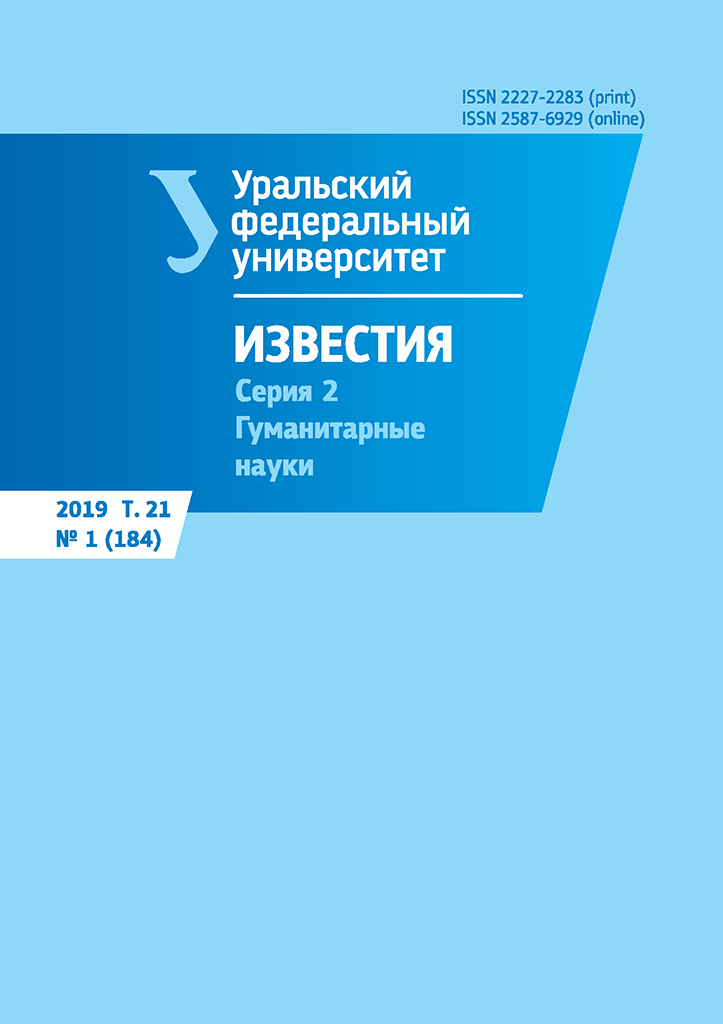ISSN: 2227-2283 (Print)
ISSN: 2587-6929 (Online)
DOI: 10.15826/izv2

Adams, J. N. (2003). Bilingualism and the Latin Language. Cambridge: Cambridge University Press.
Alcock, S. E. (1993). Graecia capta: the landscapes of Roman Greece. Cambridge: Cambridge University Press.
Assmann, J. (1992). Das kulturelle Gedächtnis. Schrift, Erinnerung und politische Identität in frühen Hochkulturen [Cultural Memory and Early Civilization: Writing, Remembrance, and Political Imagination]. München: C. H. Beck. (In German)
Assmann, J. (2004). Kul’turnaia pamiat’: Pis’mo, pamiat’ o proshlom i politicheskaia identichnost’ v vysokikh kul’turakh drevnosti [Cultural Memory and Early Civilization: Writing, Remembrance, and Political Imagination]. Moscow: Yazyki slavianskoi kul’tury. (In Russian)
Birley, A. R. (2005). The Roman Government of Britain. Oxford: Oxford University Press.
Brown, F. (1961). Roman Architecture. London: Prentice-Hall International.
Creighton, J. (2006). Britannia: The Creation of a Roman Province. London: Routledge.
Edwards, C. (1996). Writing Rome. Textual Approaches to the City. Cambridge: Cambridge University Press.
Finley, M. (1973). The Ancient Economy. London: Chatto and Windus.
Gardner, A. (2002). Social Identity and the Duality of Structure in Late Roman-period Britain. Journal of Social Archaeology, 2, 3, 323–351.
Giddens, A. (1984). The Constitution of Society: Outline of the Theory of Structuration. Cambridge: Polity.
Giddens, A. (2003). Ustroenie obshchestva: Ocherk teorii strukturatsii [The Constitution of Society: Outline of the Theory of Structuration]. Moscow: Akademicheskii proekt. (In Russian)
Gowing, A. (2005). Empire and Memory: The Representation of the Roman Republic in Imperial Culture. Cambridge: Cambridge University Press.
Hingley, R. (2000). Roman Officers and English Gentlemen: The Imperial Origins of Roman Archaeology. London: Routledge.
Hingley, R. (2005). Globalising Roman Culture: Unity, Diversity and Empire. London: Routledge.
Knabe, G. S. (2011). Evropa s rimskim naslediem i bez nego [Europe with the Roman Heritage and without It]. Saint Petersburg: Nestor-Istoriia. (In Russian)
Laurence, R. (2007). Roman Pompeii: Space and Society. London: Routledge.
Longfellow, B. (2011). Roman Imperialism and Civic Patronage: Form, Meaning, and Ideology in Monumental Fountain Complexes. Cambridge: Cambridge University Press.
Mattingly, D. J. (2011). Imperialism, Power and Identity. Experiencing the Roman Empire. Princeton; Oxford: Princeton University Press.
Miller, D., & Tilley, C. (1984). Ideology, Power and Prehistory: An Introduction. In D. Miller & C. Tilley (Eds.), Ideology, Power and Prehistory (pp. 1–15). Cambridge: Cambridge University Press.
Millett, M. (1990). The Romanization of Britain: An Essay in Archaeological Interpretation. Cambridge: Cambridge University Press.
Parker Pearson, M., & Richards, C. (1994). Ordering the World: Perceptions of Architecture, Space and Time. In M. Parker Pearson & C. Richards (Eds.), Architecture and Order: Approaches to Social Space (pp. 1–37). London: Routledge.
Revell, L. (2009). Roman Imperialism and Local Identities. Cambridge: Cambridge University Press.
Scott, S., & Webster, J. (Eds.). (2003). Roman Imperialism and Provincial Art. Cambridge: Cambridge University Press.
Shanks, M., & Tilley, C. (1982). Ideology, Symbolic Power and Ritual Communication: A Reinterpretation of Neolithic Mortuary Practices. In I. Hodder (Ed.), Symbolic and Structural Archaeology (pp. 129–154). Cambridge: Cambridge University Press.
Wallace-Hadrill, A. (1994). Houses and Society in Pompeii and Herculaneum. Princeton: Princeton University Press.
Webster, J. & Cooper, N. (Eds.). (1996). Roman Imperialism: Post-colonial Perspectives. Leicester: School of Archaeological Studies — University of Leicester.
Whittaker, C. R. (1997). Frontiers of the Roman Empire: A Social and Economic Study. Baltimore; London: The J. Hopkins University Press.
Whittaker, C. R. (2004). Rome and its Frontiers: The Dynamics of Empire. London: Routledge.
Wiedemann, T. (1992). Emperors and Gladiators. London: Routledge.
Woolf, G. (1998). Becoming Roman: The Origins of Provincial Administration in Gaul. Cambridge: Cambridge University Press.
Yegül, F. (1992). Baths and Bathing in Classical Antiquity. Cambridge, Mass.: MIT Press.
Zanker, P. (2000). The City as Symbol: Rome and the Creation of an Urban Image. In E. Fentress (Ed.), Romanization and the City: Creation, Transformations and Failures. Journal of Roman Archaeology Supplementary Series, 38, 25–41.
© (website) Уральский федеральный университет имени первого Президента России Б. Н. Ельцина
Адрес редакции: 620000, Екатеринбург, пр. Ленина, 51. «Известия Уральского федерального университета. Серия 2. Гуманитарные науки»
E-mail: izvestia.2@yandex.ru